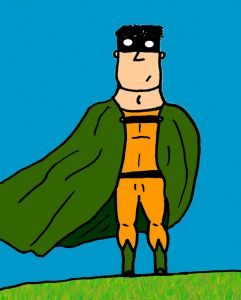Yesterday, we explored the journey that a hero must undertake in any great story. Likewise, we discussed heroic feats of greats such as Neo from The Matrix, Frodo, and Luke Skywalker.
Those that represent the light. We cheer for them, because we are able to assimilate their victory into our own lives. If young Skywalker wins…we all do. If Frodo destroys the one ring, then, Sauron is gone. It’s an exciting end to an epic saga.
The way it should be.
But, what happened to make the ending so sweet in each tale?
Why was the victory so satisfying? The win awe-inspiring?
I’ll save you the lecture on rising conflict and plot points, but suffice it to say that one thing made each hero’s journey so utterly monumental and terrific–
The Villain.
Yes. I love the cry that we sometimes hear from the bad guy camps around the cinematic (and literary) world: “Hey! We’re people too!”
It’s true. The bad guys make the story a lot of times. Think about it.
- The Joker played by Heath Ledger made The Dark Knight stand out from other all other Batman films.
- Voldemort (yes, I typed his name…I didn’t say it) made Harry Potter interesting.
- Heck, even Agent Smith from The Matrix added layers with his beautiful repetition of, “Mr. Anderson” when addressing Neo.
They are all villains drawn up to make the hero’s journey even more epic. The more 3-D a villain becomes it allows the storyline to become even richer. The rising conflict reaches a peak that draws the reader/audience into the turmoil.
Look at how much Anakin Skywalker changes from Phantom Menace (Star Wars 1) to Revenge of the Sith (3). He becomes Darth Vader. Not just a small shift from bad-to-worse but a complete overhaul as a person. The once highly touted Jedi is no more. The seduction of the dark side is too much for him. And thus, a villain for the ages is born.
I want to keep using Darth Vader as an example of the magnificent height that a villain can reach in making a storyline epic. Yes. He gives in to the dark side. But, his journey started as a Hero’s Journey.
Talk about a twist of fate, right?
Anakin was set on a course for greatness…to become a Jedi respected by all. Yet, instead of delivering on those promises, he crushes them. Anakin becomes Darth Vader and rejects peace for war. He unleashes a hell on the goodness around him, and he casts his quest for heaven aside.
It’s heartbreaking and…uniquely its own take on the “hero gone astray” motif. But…there is redemption.
*Spoiler alert*
Darth sees his son Luke in trouble with the Emperer and saves him from death. As a result of his spiritual change, Darth is restored as Anakin Skywalker just before his death. The hero-turned-villain-turned-hero has come full circle. It isn’t something we’re used to seeing in literature (or film), and the range of this villain makes for one of the best examples of all-time.
Please take in this next part, because it isn’t the model of a villain existing for the sole purpose of giving the hero some opposition, someone to fight. Yeah. The fighting is nice and battle sequences are, too. But, it’s the humanity of the villain that makes the story so well-balanced.
Again, think of your favorite story of all-time.
Got one?
Now…imagine that story without the villain roaming around, wreaking havoc.
Is it as good?
I surely hope not.
Stories given 5-stars, 2 Thumbs up, 10/10 ratings have a beginning, middle, and end. The characters depart, initiate, and return. But, the truly great ones also have flesh-and-blood good guys and bad guys fighting for their lives.
And sometimes the bad guys might’ve once been good guys and aren’t quite sure how to become good guys again…And just maybe…they do learn by the end of the tale.


